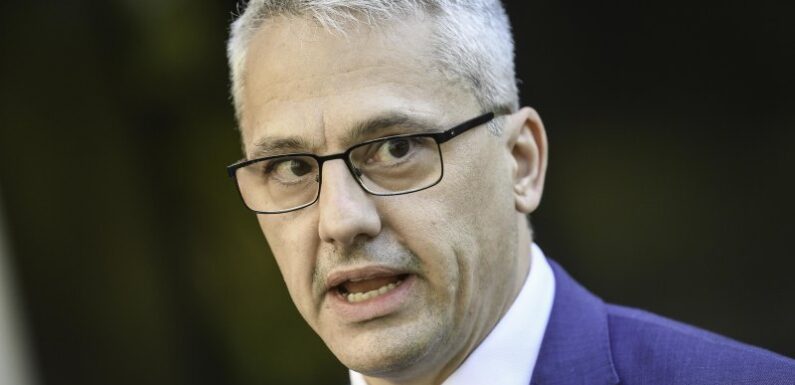
Save articles for later
Add articles to your saved list and come back to them any time.
New laws to limit how much money workers can access in mental health WorkCover claims face a battle to get through parliament, despite warnings that they are needed to prevent premiums being hiked.
There are just nine Victorian parliamentary sitting days left in the year for the Allan government to deliver the WorkCover changes it says are vital to prevent further premium rises, placing a tight deadline on parliament to pass laws before the summer break.
While business groups have called for swift action on the changes, the state’s union movement remains opposed to any moves to limit the type of mental health claims employees can access.
WorkSafe Minister Danny Pearson.Credit: Justin McManus
In May, then-premier Daniel Andrews said WorkCover was “fundamentally broken” as it recorded annual deficits of $1.1 billion driven by the rising cost of mental health claims. He said premiums would rise by 42 per cent but would need to be accompanied by tighter rules such as limiting weekly benefits for stress and burnout.
The premium rises came into effect from July 1, 2023, but the changes to claims are yet to be legislated despite being expected from January 2024. The legislation has not yet been seen by the state opposition or crossbench MPs, whose support will be needed to get them through the upper house.
A government spokesman said: “We’ve been honest that WorkCover is fundamentally broken, and that’s why we’re modernising the scheme … this is a crucial reform that will ensure WorkCover can continue to support injured workers in Victoria.
“We’ve worked with industry, unions and other stakeholders to ensure we can make WorkCover sustainable, and we’ll continue to talk to all political parties.”
The Coalition and crossbench parties such as the Greens have not committed to a position on the changes until they see the laws in full. Bills are typically considered for two weeks after they are first introduced to parliament so MPs can consult further before voting on them. However, this process can be fast-tracked.
Opposition WorkCover spokeswoman Cindy McLeish said the government had left itself with a tight timeframe to deliver complex changes that needed significant community consultation.
“WorkSafe has been heading in a downward spiral for years now and this is very much overdue, but I’m worried that they’re rushing it,” she said.
“Legislation must be coming through very quickly, and I imagine it’s very substantial.
Victorian Chamber of Commerce and Industry chief Paul Guerra.Credit: Luis Enrique Ascui
“It is fair that everyone gets a good deal of time, an appropriate time, to deal with it.”
Victorian Chamber of Commerce chief executive Paul Guerra said swift action was needed to implement the changes needed to keep the scheme workable.
Under the changes, which are not retrospective, employees claiming stress and burnout will not be eligible for weekly benefits but can receive 13 weeks of support for treatment. Injured workers who have received benefits for more than 130 weeks will have to prove permanent impairment of more than 20 per cent.
The changes were proposed because mental health concerns had risen to make up 16 per cent of all WorkCover claims and were on track to be 50 per cent of the scheme’s costs. This was expected to rise further without adjusting the current laws.
Speaking in May, Andrews said the legislation was needed as part of a package to make WorkCover sustainable alongside increasing the average premium charged to businesses from 1.27 per cent of total employee costs to 1.8 per cent.
“If those legislative changes are not made, then the only tool to repair, rebuild and make fit for purpose this scheme will be premiums,” he said at the time.
“The actuaries tell us that under that scenario, premiums would be closer to 3 per cent than 2 per cent. We don’t want that. That would be a very, very big cost on business.
“I’m essentially urging people across the political spectrum when these amendments come to parliament. If they’re not supported, if we don’t see a passage of these structural changes to the scheme, then premiums would have to go up even further.”
Trades Hall secretary Luke Hilakari said the union movement did not support any changes that removed existing rights for workers.
“We fundamentally believe that any worker that gets injured on the job should have the support of the WorkCover system to get better, and to get back to their work,” he said.
Hilakari said there should be a larger workforce set up to support those with mental health concerns, which could in turn reduce costs on the scheme by preventing claims and helping people come back to work.
Get the day’s breaking news, entertainment ideas and a long read to enjoy. Sign up to receive our Evening Edition newsletter here.
Most Viewed in Politics
From our partners
Source: Read Full Article

